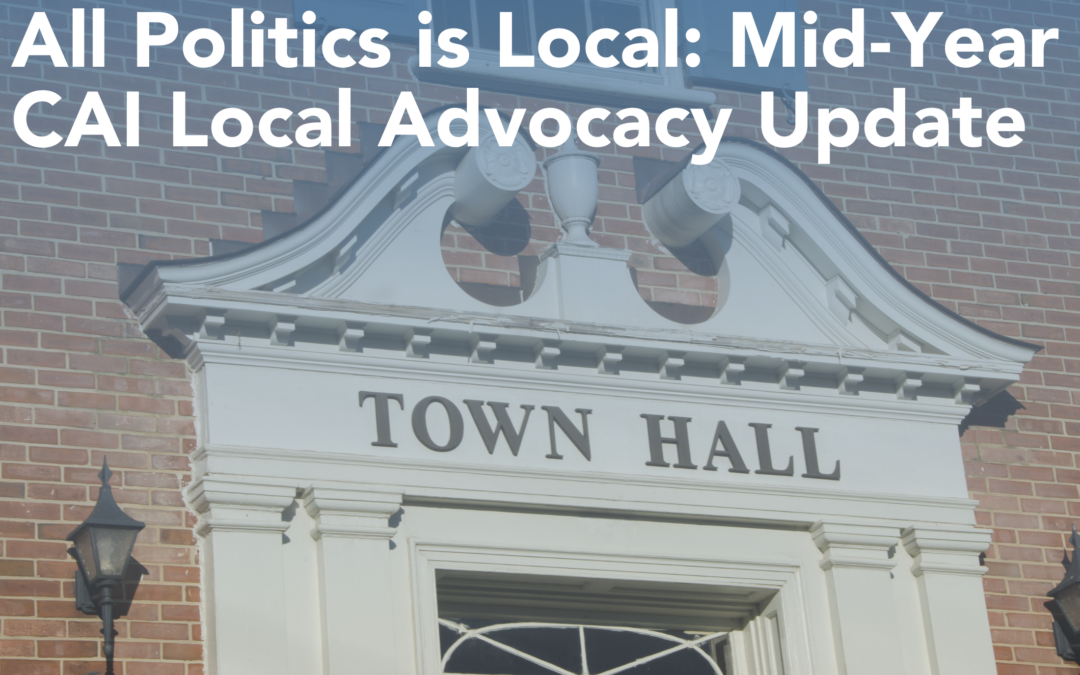CAI Advocacy works with state legislative action committees (LACs) across the country to increase our advocacy presence at the local level. Over the last several years the community association industry saw an increase in the number of proposed ordinances in counties, cities, and townships, which directly impact community associations. From foreclosure assistance to short-term rentals, to modifying existing zoning laws, CAI saw a variety of issues, which resulted in engagement from state LACs. Here are a few highlights of ordinances impacting the community association housing model, introduced over the last year at the local level, where CAI’s LACs were involved with advocacy efforts.
Denver, Colorado
In June 2022, the Denver City Council discussed Ordinance 22-0617, requiring unit owners’ associations to notify homeowners of certain rights when initiating a foreclosure action and consolidating existing notice and disclosure duties for tenant rights. The Colorado Legislative Action Committee was on hand to testify and provide valuable insight on the process of foreclosures in community associations to city councilmembers. The information provided during the CO-LAC’s testimony helped legislators craft a bill, which provides community associations with a form from the city to include as a part of normal foreclosure paperwork, listing legal and housing resources for owners facing foreclosure.
Lauderhill and Broward County, Florida
In June 2023, the City Commission of Lauderhill, Florida passed resolution 23R-07-186, urging the Broward County Commission to explore the feasibility of creating a new funding source for needed condominium improvements, as residents look to comply with the new inspection requirements of SB 154, which was passed at the state level this year. The CAI Florida Legislative Alliance sent letters to the Lauderhill City Commission thanking them for their leadership on this important issue, and to the Broward County Commission, urging it to take appropriate action to increase the availability of funding mechanisms for condominium associations trying to finance critical structural repairs. As of writing, the Broward County Commission has yet to express a response to the Lauderhill resolution.
Los Angeles, California
In June 2023, the LA City Council transmitted action 21-0890-S4 to the LA Department of Water and Power, directing the Department to study the feasibility of prioritizing EV charging rebate applications for multifamily dwelling units that are located in disadvantaged communities. The California LAC sent a letter to the city council supporting measures to help expand access to financing opportunities for electric vehicle charging stations, requesting the Los Angeles Department of Water and Power include condominiums in its feasibility study, and not limit itself to studying rental units. CAI members in Los Angeles continue to reach out to the city council to advocate this position. LA residents interested in joining advocacy efforts can reach out to government@caionline.org for more information.
St. Louis, Missouri
In May 2023, the St. Louis Board of Aldermen introduced ordinance BB-33, which would require a permit for the operation of any short-term rental (and outlines processes for approval, denial, and appeal), and would require the designation of a short-term rental agent as a point of contact for any concerns regarding the operation of a short-term rental. The Missouri LAC was engaged with legislators, testifying before the Board of Aldermen’s Transportation and Commerce Committee during a hearing in June 2023, and working to ensure existing community association bylaws are not overridden. St. Louis residents interested in joining advocacy efforts can reach out to government@caionline.org for more information. As of writing, BB-33 has not advanced further in the committee process and is still considered live.
Tucson, Arizona
In May 2023, the mayor and city council of Tucson, Arizona held a study session on the current difficulties faced by community associations looking to remove discriminatory restrictive covenant language from their governing documents, and to potentially ask the state legislature to pass legislation creating an expedited process for removal. The Arizona Legislative Action Committee sent comments in support of such legislation, and reiterated the difficulties currently faced by community associations looking to remove blatantly illegal language from their governing documents. The removal of discriminatory restrictive covenants is a priority for CAI. Our public policy is to support legislation, which allows for the removal of discriminatory restrictive covenants via a simplified process by an association board. The city council ultimately voted in favor of asking the state legislature to pass legislation creating an expedited process.
CAI continues to build its presence at the local level. LACs are encouraged to appoint and use a local liaison to act as a point person for advocacy in each state’s largest jurisdictions. Much like how LAC federal liaisons stand ready to help organize advocacy efforts to contact specific members of Congress representing a state, local liaisons help LACs with local-level advocacy efforts, providing valuable insight on community association governance, and living to local-level lawmakers as homeowners, community managers, and business partners.
Are you interested in helping to lead future advocacy efforts in your area? Sign up today to become a CAI Advocacy Ambassador, and make your voice heard: https://www.caionline.org/Advocacy/TakeAction/Pages/Advocacy-Ambassadors.aspx.



